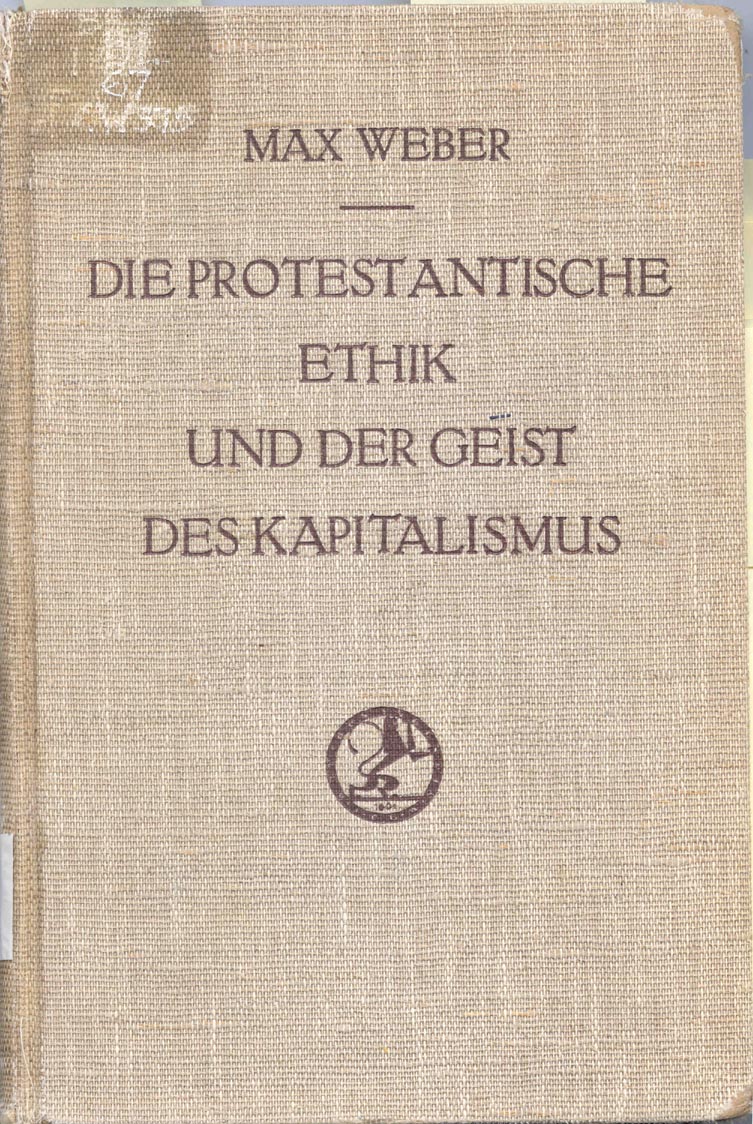 I'm reading a book called "the protestant ethic and the spirit of capitalism," written by German economist/sociologist Max Weber in approximately 1905. It's a story about theological shifts changing the world forever...
I'm reading a book called "the protestant ethic and the spirit of capitalism," written by German economist/sociologist Max Weber in approximately 1905. It's a story about theological shifts changing the world forever...Weber goes back to Calvin in the 16th century and describes his Protestantism as founded upon two theological pillars: a view of God as primarily transcendent and all powerful, and a view of soteriology emphasizing predestination and divine election. The combination of these two concepts, says Weber, led logically to "massive fatalism, loneliness, and anxiety among the faithful." Reformulations of Calvin's teachings in the next century led believers to eventually "uphold an ethos of 'world mastery' and to orient their entire lives toward work and material success."
"God desired action in strict conformity with His commandments and laws. Yet virtuous conduct, in light of the sinful character of the human species, proved difficult. Indeed, taming all wants and physical desires, and then orienting life in a consistent fashion to His laws, required heroic efforts of discipline."
"If they proved capable of mastering their selfish desires and leading righteous, dignified lives oriented unequivocally to God's commandments, then they could assume that the capacity to do so had been in fact bestowed upon them by their deity, who after all was omniscient and all-powerful."
If they could achieve this lifestyle, the crucial question- "am I among the saved?" - would be answered affirmatively and thus "held in check the tremendous anxiety and fatalism that resulted logically from the doctrine of predestination. Simultaneously, this gave birth to a frame of mind that Weber saw as specifically Puritan: the tempered, dispassionate, and restrained disposition that completely tamed the self and lead to a systematic rationalization of life."
Such was the fodder out of which was born the religion that "baptized" work and "idolized" vocation making all other areas of life secondary or trivial. This Protestant work ethic would be the mindset of the founding fathers of this country and eventually birth the vision of the "American Dream" out of which would come the United States of Capitalism.
Theology is dangerous.

4 comments:
wow, phil what a powerful and challenging book. i'll have to pick it up when i have a moment to read. thank you for presenting thoughtful insights.
What's so interesting to me is the ebb and flow of theology throughout the history of the church. Every new idea - or reworking of an old idea - seems doomed to go too far and, after bringing some kind of renewal, bring disease into the church. How do we continue the long historical dialogue that has brought us so far and taught us so much about Christ and his mission that surely even the apostles couldn't have grasped in their lifetimes, without continually getting carried away and forcing those after us to counteract what we have done and taught and learned?
It's a question I've been asking myself to no avail in the last 12 months. The history of ideas has taught us more than we can hope to learn - on what can we rest?
great question chad, it's one i struggle with too. (and jeremy, i know you and i may not see eye to eye on this) but i see the christian theological task as exactly that- to discover what the incarnation means today. not only in theory, but actually- ie: we are literally the hands and feet of Christ. the incarnation was a historical event and is also an ongoing reality we are called to embody.
"on what can we rest?" you asked. i find rest in knowing that the Spirit of Truth will guide those who follow Jesus. the Holy Spirit isn't "second best"- leaving us in theological darkness. Christ ascended so that the Spirit of Truth could come and we could all live as if he continued among us.
But because we "see through the glass darkly" theology is about the interplay of your hermeneutics with mine- emphasizing the importance of an interpretive community (midrash), and not only with those who have the same views.
in lieu of the text in the post, i would applaud calvin for his contextal hermeneutics, most likely appropriate for his time and place. the way i see it, the error consists in assuming any arrival at absolute truth. we must continue to do theology in context because that is what the incarnation means.
we have the Text, the Spirit is with us. We must read our story (tradition, church history, God at work in the world) and align ourselves with the trajectory of redemption.
(ok, i've said too much...)
jere,
perhaps what our friend lacked was the hermeneutic community. the road he took was by himself and that is never wise. i agree with you in that we need the discernment of the church to guide us, that is essential for life together, towards God in this world.
this dialogue makes me long for a trip to moody's pub with you (preferably on bicycles in the rain) to split a pitcher of sangria! peace brother.
Post a Comment